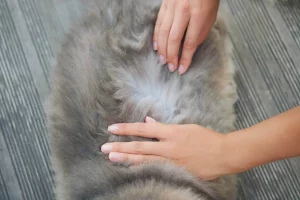Introduction
Today, we’re diving into a heart-warming topic that hits close to home for many of us – pet therapy and how it can be a game-changer when it comes to tackling depression. We all know that our beloved pets have a way of brightening up even the darkest of days, but did you know there’s actual science behind it? Yup, it’s not just fuzzy feelings; there’s some serious brain stuff going on!
Let’s face it, depression is no joke. It’s like having a big, dark cloud hanging over you, zapping all the joy and energy out of life. But fret not, because your fluffy companions are here to save the day!
So, in this article, we’ll explore the incredible bond between humans and animals and how our four-legged friends can be an integral part of the battle against depression. Get ready to uncover the secrets behind why our pets are the ultimate mood boosters and therapists!
Ready? Let’s roll!
The Science of Pet Therapy
First things first, let’s peek into the science behind why our furry pals have such a magical effect on our mental state. It all boils down to chemistry, folks! When you spend time with your pet, whether it’s cuddling, playing fetch, or just having a chat (yes, they’re excellent listeners!), your brain releases a hormone called oxytocin. This nifty little hormone is often dubbed the “love hormone” or “bonding hormone” because it plays a huge role in forming connections, not just between parents and babies but also between humans and animals!
But wait, there’s more! Interacting with pets also triggers the release of other happy chemicals like dopamine and serotonin. These are the guys responsible for making you feel all warm and fuzzy inside, reducing stress, and boosting your overall mood. So, when you’re having a rough day, spending time with your pet can help wash away those worries and leave you feeling happier and more at peace.
Understanding Depression
Before we get into the nitty-gritty of how pet therapy works its magic, let’s talk about depression itself. You see, depression isn’t just about feeling a bit blue or down in the dumps; it’s a serious mental health condition that can really mess with your life. It can show up in various ways, like constant sadness, loss of interest in things you used to enjoy, changes in sleep and appetite, and feeling like you’re carrying the weight of the world on your shoulders.
Depression can be caused by a bunch of factors, from genetics and brain chemistry to life events and stress. It’s like a sneaky ninja, creeping up on you when you least expect it. But fear not, because this is where your furry sidekick comes into play!

The Role of Pets in Depression Treatment
Picture this: You’re having a tough day – you’re feeling lonely, overwhelmed, and just downright blue. Who comes to the rescue? Your pet, of course! These amazing creatures have a way of providing unconditional love and support like no other. They don’t care if you’ve got a bad hair day or if you’re feeling grumpy. They’re just there, by your side, making you feel like the most important person in the world.
Pets can complement traditional therapies like counseling and medication. When used alongside these treatments, pet therapy can help you make even greater strides in overcoming depression. They provide a unique form of emotional support, reducing feelings of isolation and loneliness. Plus, they have this uncanny ability to sense when you need an extra dose of comfort, like they have a sixth sense for human emotions!
Pet Selection and Care Considerations
Okay, so you’ve decided to take the plunge and get a pet to help with your depression. But which one is the best fit? Dogs are known for their loyalty and playful nature, making them excellent emotional support buddies. Cats, on the other hand, are independent yet super comforting. But hey, it’s not just limited to dogs and cats! Rabbits, guinea pigs, birds – they all can do wonders for your mental health.
Precautions and Potential Challenges
As much as we adore our furry pals, it’s essential to consider potential challenges. Allergies can be a real bummer, so make sure to check for any allergies before bringing a pet home. And if you’re afraid of animals, no worries! There are ways to overcome that fear, like gradually exposing yourself to pets in a safe and controlled manner.

Remember, having a pet is a responsibility, so make sure you’re ready for the commitment. They need love, attention, and proper care, just like we do!
Also, keep in mind that pets have shorter lifespans than us, and saying goodbye can be tough. But remember, the love and joy they bring into your life make every moment worth it.
Real-Life Testimonials
We bet you’re wondering if all this pet therapy stuff is just hype. Well, let us tell you, it’s the real deal! Countless people with depression have shared their incredible stories of how their pets have been true saviors in their lives. These heart-warming anecdotes are a testament to the power of the human-animal bond.
The Power of Unconditional Love
One of the most remarkable aspects of pet therapy is the power of unconditional love that our furry companions provide. Pets don’t judge us based on our appearance, social status, or past mistakes. To them, we are simply their beloved human, and they adore us just the way we are.
When you’re feeling low, having a pet by your side can be an instant mood lifter. They sense your emotions and respond with empathy, whether it’s snuggling up to you when you’re sad or playfully demanding attention when you’re feeling down. Their ability to tune in to our emotional needs is truly uncanny, and it creates an unbreakable bond that fills our hearts with joy.
Moreover, the responsibility of caring for a pet can give a sense of purpose and routine to individuals struggling with depression. Knowing that a little ball of fur is relying on you for food, play, and cuddles can be a powerful motivator to get out of bed and take care of yourself too.
Reducing Stress and Anxiety
Depression often goes hand-in-hand with stress and anxiety, forming a trifecta of emotional turmoil that can be tough to overcome. But have no fear, because our trusty pets are here to save the day yet again! The simple act of petting a dog or stroking a cat has been shown to reduce stress and lower cortisol levels, the hormone responsible for stress responses.
It’s like a mini relaxation session with your fur baby, and the best part is, you can do it whenever you need a quick pick-me-up!
Taking your dog for a walk is not just great for their exercise; it’s also beneficial for your mental health. Being outdoors and connecting with nature can do wonders for reducing anxiety and lifting your spirits. Plus, you’ll likely meet other pet owners along the way, giving you an opportunity to socialize and share the love for your pets.
Breaking the Walls of Isolation
One of the most challenging aspects of depression is the overwhelming sense of isolation it brings. It’s like being stuck in a bubble, cut off from the world around you. But here’s where pets work their magic as social facilitators!
If you’ve ever taken your dog to a park or joined a pet-related community, you’ll know just how easy it is to strike up a conversation with fellow pet lovers. Pets have a way of breaking down social barriers and sparking connections between people who might otherwise never have crossed paths. Suddenly, you’re not alone in your love for animals, and those conversations can lead to friendships that extend beyond the furry realm.

Even if you prefer the comfort of your home, your pet can still help you feel less isolated. Whether it’s watching TV together, talking to them about your day (yes, they understand more than you think!), or simply having them curl up beside you while you read a book, their presence brings a sense of companionship that’s hard to replicate.
The Healing Power of Play
Remember the carefree days of childhood when playing was our main job? Well, our pets have a way of bringing that joyful spirit back into our lives. They remind us to live in the moment, to let go of our worries, and simply enjoy the present.
Whether it’s chasing a ball, engaging in a game of tug-of-war, or watching your cat go wild with a feather toy, playing with your pet is a fantastic stress reliever. It not only distracts you from negative thoughts but also releases endorphins, those delightful chemicals that make you feel all warm and fuzzy inside.
So, next time you’re feeling overwhelmed by life, take a cue from your pet and indulge in some playtime. You’ll be amazed at how quickly your mood can lift, and you might even find yourself laughing out loud as your furry friend showcases their silly antics!
Pet Therapy Techniques: From Therapy Dogs to Unlikely Heroes
Alright, pet lovers, get ready to dive into the fascinating world of pet therapy techniques! There are various ways our beloved pets can help us overcome depression, and each technique brings its unique set of benefits.
1. Animal-Assisted Therapy (AAT)
Imagine walking into a therapy session and being greeted by a wagging tail or a gentle purr. That’s the magic of Animal-Assisted Therapy (AAT)! In this form of therapy, trained animals like therapy dogs, cats, and even horses work alongside healthcare professionals to support patients’ emotional and mental well-being.
Therapy animals are superstars in the world of healing. They have a natural gift for sensing human emotions and providing comfort without judgment. Whether it’s a warm nuzzle or a soft paw resting on your hand, their presence can instantly soothe anxiety and create a safe space for exploring emotions.
AAT is commonly used in hospitals, nursing homes, and rehabilitation centers, but it’s also becoming more prevalent in mental health settings. Patients who might feel hesitant or guarded in traditional talk therapy often find it easier to open up when there’s a furry friend by their side. Plus, the joy and positive energy that therapy animals bring can make the whole healing process feel less clinical and more like spending time with a friend.
2. Emotional Support Animals (ESAs)
Now, let’s talk about the superheroes of the pet world – Emotional Support Animals (ESAs). These special pets provide comfort and companionship to individuals with mental health conditions, such as depression. The bond between an ESA and their human is truly extraordinary, as they become a constant source of love and stability.
ESAs are not just pets; they are recognized by mental health professionals as part of a treatment plan for managing depression. Having an ESA means you can have your furry sidekick with you in places where pets are usually not allowed, like airplanes or rental properties with no-pet policies. That means you get to share the benefits of their company even during life’s challenging moments, like traveling or moving to a new place.

It’s essential to note that ESAs require proper training and behavior to ensure they can provide the support needed in various environments. So, if you’re considering getting an ESA, investing time in training and socialization will make your bond even stronger.
Heart-warming Real-Life Testimonials
Now, let’s get to the most heart-warming part – real-life stories of people whose lives have been forever changed by the love and support of their pets.
Meet Sarah, a young woman who battled depression for years. The weight of her struggles made it difficult for her to connect with others, until she adopted Luna, a rescue cat with bright green eyes. Luna’s quiet and gentle nature provided Sarah with a sense of peace and security she had never experienced before. Over time, Sarah’s bond with Luna helped her open up to her friends and family, and she began to see the world in a new light.
Then there’s Mike, a veteran who returned home with PTSD and depression. He felt isolated and overwhelmed until he met Max, a loyal Labrador Retriever trained as a therapy dog. Max was a steady and calming presence in Mike’s life, offering him a sense of purpose and unconditional love. With Max by his side, Mike found the strength to attend support groups and engage in activities he once enjoyed.
These stories are just a glimpse of the countless individuals whose lives have been enriched by pet therapy. From dogs and cats to rabbits and even miniature pigs, animals have the power to heal hearts and mend souls in ways that words alone cannot express.
Pet Therapy: Making It Work for You
Whether you already have a pet or are considering adopting a new furry friend, these tips will help you make the most of the incredible benefits that pets can bring to your mental health.
1. Finding the Perfect Pet Match
First things first, let’s talk about finding the perfect pet match for your needs and lifestyle. Dogs and cats are the most common choices for emotional support, but don’t limit yourself to these options if you have a special affinity for other animals. Rabbits, guinea pigs, birds, and even reptiles can form deep bonds with their human companions and provide just as much comfort and companionship.
Consider your living situation, available time, and any allergies or health conditions before making your decision. If you’re adopting from a shelter, spend time interacting with the animals to see if there’s a natural connection. Trust us, when it’s the right fit, you’ll feel it in your heart.
2. Embracing the Responsibilities
Owning a pet is a big responsibility, but it’s also incredibly rewarding. Your pet will rely on you for food, exercise, grooming, and love. So, before you bring a pet into your life, be sure you’re ready to commit the time, effort, and financial resources needed to give them the best life possible.
The good news is that these responsibilities can be a source of structure and routine, which can be incredibly beneficial for individuals with depression. Having a regular schedule for feeding, walks, and playtime can give you a sense of purpose and stability.
3. Creating a Pet-Friendly Environment
Make your home a welcoming haven for your new furry friend. Set up a cozy bed, provide toys for play, and ensure they have a designated space where they can retreat when they need some alone time. Cats, in particular, appreciate having high perches to observe the world from above.

4. Incorporating Pet Time into Your Day
Whether you have a therapy dog or an ESA, setting aside time to bond with your pet is crucial. Even just a few minutes of cuddling or play can do wonders for your mood. Take your dog for a walk in the park, engage your cat in interactive play, or simply relax together while you unwind.
5. Getting Support from Professionals
If you’re considering an Emotional Support Animal, it’s essential to get proper documentation from a licensed mental health professional. This documentation will ensure that you have the legal right to have your pet with you in places where pets are not typically allowed.
6. Joining Pet-Related Communities
Being a part of pet-related communities, whether in-person or online, can be a great way to connect with other pet owners and share experiences. There are plenty of online forums, social media groups, and local meetups where you can find like-minded people who understand the special bond you have with your pet.
7. Seeking Professional Help
Remember, pet therapy is a powerful addition to your depression management, but it’s not a substitute for professional treatment. If you’re struggling with depression, seeking help from a mental health professional is essential. They can help you create a comprehensive treatment plan that incorporates pet therapy alongside counseling and, if necessary, medication.

A Final Word of Encouragement: Let Love Heal
As we come to the end of this journey exploring the wonders of pet therapy, we want to leave you with a final word of encouragement.
Life can be tough, and depression can feel like an insurmountable mountain. But know that you don’t have to climb it alone.
The love and support of a furry companion can make all the difference in the world.




